| Listing 1 - 10 of 54 | << page >> |
Sort by
|
Book
ISBN: 3860577212 9783860577219 Year: 2000 Publisher: Tübingen : Stauffenburg,
Abstract | Keywords | Export | Availability | Bookmark
 Loading...
Loading...Choose an application
- Reference Manager
- EndNote
- RefWorks (Direct export to RefWorks)
Die von A. Prince, P. Smolensky und J. McCarthy seit Beginn der 90er Jahre entwickelte Optimalitätstheorie wird als die linguistische Theorie der Jahrtausendwende angesehen und hat über die Grenzen der Sprachwissenschaft hinaus breites Interesse gefunden. Dennoch existierte bislang noch keine systematische Einführung in die optimalitätstheoretische Syntax. Das vorliegende Buch schließt diese Lücke. Zentrale Elemente der Theorie wie Verletzbarkeit, Konflikt und Ordnung von syntaktischen Beschränkungen werden anhand von Beispielsätzen entwickelt – schwerpunktmäßig in empirischen Bereichen, in denen die Unterschiede dieser Syntax zu anderen Syntaxmodellen besonders deutlich werden. Damit liegt eine umfassende Darstellung der Möglichkeiten und Grenzen dieses neuen Syntaxmodells vor, dessen Kenntnis für all diejenigen unverzichtbar ist, die an moderner Grammatiktheorie interessiert sind.
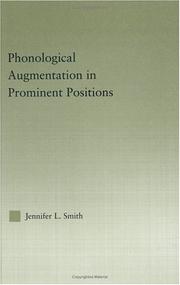
ISBN: 0415971071 Year: 2005 Publisher: New York (N.Y.) : Routledge,
Abstract | Keywords | Export | Availability | Bookmark
 Loading...
Loading...Choose an application
- Reference Manager
- EndNote
- RefWorks (Direct export to RefWorks)
Grammar, Comparative and general --- Optimality theory (Linguistics). --- Psycholinguistics. --- Phonology.
Book
Year: 2005 Publisher: New York : Taylor & Francis,
Abstract | Keywords | Export | Availability | Bookmark
 Loading...
Loading...Choose an application
- Reference Manager
- EndNote
- RefWorks (Direct export to RefWorks)
Phonologically prominent or "strong" positions are well known for their ability to resist positional neutralization processes such as vowel reduction or place assimilation. However, there are also cases of neutralization that affect only strong positions, as when stressed syllables must be heavy, default stress is inserted into roots, or word-initial onsets must be low in sonority. In this book, Jennifer Smith shows that phonological processes specific to strong positions are distinct from those involved in classic positional neutralization effects because they always serve to augment the strong position with a perceptually salient characteristic. Formally, positional augmentation effects are modeled by means of markedness constraints relativized to strong positions. Because positional augmentation constraints are subject to certain substantive restrictions, as seen in their connection to perceptual salience, this study has implications for the relationship between functional grounding and phonological theory.
Grammar, Comparative and general --- Psycholinguistics. --- Optimality theory (Linguistics) --- Phonology.
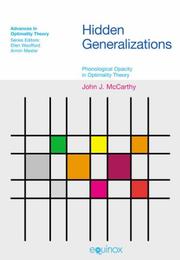
ISBN: 184553574X 9781845535742 9781845530518 1845530519 9781845530525 1845530527 Year: 2007 Publisher: London Equinox Pub.
Abstract | Keywords | Export | Availability | Bookmark
 Loading...
Loading...Choose an application
- Reference Manager
- EndNote
- RefWorks (Direct export to RefWorks)
Hidden Generalizations is the first monograph devoted exclusively to the problem of phonological opacity. Opacity arises when the conditions for or results of an active phonological process are not evident in the speech signal. Opacity is particularly important in Optimality Theory, which lacks the standard means of analyzing opacity, rule ordering.
Grammar, Comparative and general --- Opacity (Linguistics) --- Optimality theory (Linguistics) --- Phonology.
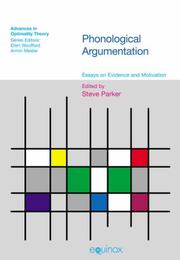
ISBN: 1845535944 9781845535940 9781845532215 184553221X 9781845532208 1845532201 Year: 2009 Publisher: London Equinox Pub.
Abstract | Keywords | Export | Availability | Bookmark
 Loading...
Loading...Choose an application
- Reference Manager
- EndNote
- RefWorks (Direct export to RefWorks)
This volume presents a series of original papers focusing on the theme of phonological argumentation, set within the framework of Optimality Theory.
Optimality theory (Linguistics) --- Grammar, Comparative and general --- Morphology. --- Phonology.
Book
Year: 2005 Publisher: New York : Taylor & Francis,
Abstract | Keywords | Export | Availability | Bookmark
 Loading...
Loading...Choose an application
- Reference Manager
- EndNote
- RefWorks (Direct export to RefWorks)
Phonologically prominent or "strong" positions are well known for their ability to resist positional neutralization processes such as vowel reduction or place assimilation. However, there are also cases of neutralization that affect only strong positions, as when stressed syllables must be heavy, default stress is inserted into roots, or word-initial onsets must be low in sonority. In this book, Jennifer Smith shows that phonological processes specific to strong positions are distinct from those involved in classic positional neutralization effects because they always serve to augment the strong position with a perceptually salient characteristic. Formally, positional augmentation effects are modeled by means of markedness constraints relativized to strong positions. Because positional augmentation constraints are subject to certain substantive restrictions, as seen in their connection to perceptual salience, this study has implications for the relationship between functional grounding and phonological theory.
Grammar, Comparative and general --- Psycholinguistics. --- Optimality theory (Linguistics) --- Phonology.
Book
Year: 2005 Publisher: New York : Taylor & Francis,
Abstract | Keywords | Export | Availability | Bookmark
 Loading...
Loading...Choose an application
- Reference Manager
- EndNote
- RefWorks (Direct export to RefWorks)
Phonologically prominent or "strong" positions are well known for their ability to resist positional neutralization processes such as vowel reduction or place assimilation. However, there are also cases of neutralization that affect only strong positions, as when stressed syllables must be heavy, default stress is inserted into roots, or word-initial onsets must be low in sonority. In this book, Jennifer Smith shows that phonological processes specific to strong positions are distinct from those involved in classic positional neutralization effects because they always serve to augment the strong position with a perceptually salient characteristic. Formally, positional augmentation effects are modeled by means of markedness constraints relativized to strong positions. Because positional augmentation constraints are subject to certain substantive restrictions, as seen in their connection to perceptual salience, this study has implications for the relationship between functional grounding and phonological theory.
Grammar, Comparative and general --- Psycholinguistics. --- Optimality theory (Linguistics) --- Phonology.
Multi
ISBN: 9055690465 Year: 1998 Publisher: Leiden : Holland institute of generative linguistics,
Abstract | Keywords | Export | Availability | Bookmark
 Loading...
Loading...Choose an application
- Reference Manager
- EndNote
- RefWorks (Direct export to RefWorks)
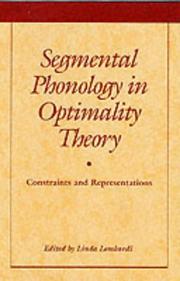
ISBN: 0521790573 0521153506 0511570589 9780511570582 9780521790574 9780521153508 Year: 2001 Publisher: Cambridge Cambridge University Press
Abstract | Keywords | Export | Availability | Bookmark
 Loading...
Loading...Choose an application
- Reference Manager
- EndNote
- RefWorks (Direct export to RefWorks)
Optimality theory has rapidly become the dominant framework in formal phonological theory. OT fundamentally revises the basic notions of generative grammar, replacing rules and derivations with a system of interacting constraints. Early work in OT tended to concentrate mainly on prosodic phonology and the phonology-morphology interface, and it was not initially clear how the theory could attack the rich range of phenomena found in segmental alterations. However, there is a body of work that concentrates on working out the details of featural phonology with OT, and this work shows that the theory allows superior explanations of the typological possibilities and the underlying motivations for these phenomena. This volume, first published in 2001, brings together work by some of the influential researchers in this area, ranging from the authors of influential dissertations to prominent senior faculty.
Phonetics --- Grammar, Comparative and general --- Optimality theory (Linguistics) --- Phonology. --- Optimality theory (Linguistics). --- Optimality (Linguistics) --- Optimization (Linguistics) --- Generative grammar --- Linguistics --- Philology --- Grammar, Comparative and general Phonology --- Phonology
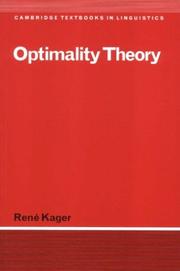
ISBN: 9780521580199 9780511812408 9780521589802 0521580196 0521589800 Year: 1999 Publisher: Cambridge: Cambridge university press,
Abstract | Keywords | Export | Availability | Bookmark
 Loading...
Loading...Choose an application
- Reference Manager
- EndNote
- RefWorks (Direct export to RefWorks)
Optimality theory (Linguistics) --- Optimality theory (Linguistics). --- 801.56 --- 801.56 Syntaxis. Semantiek --- Syntaxis. Semantiek --- Optimality (Linguistics) --- Optimization (Linguistics) --- Generative grammar --- Grammar
| Listing 1 - 10 of 54 | << page >> |
Sort by
|

 Search
Search Feedback
Feedback About UniCat
About UniCat  Help
Help News
News